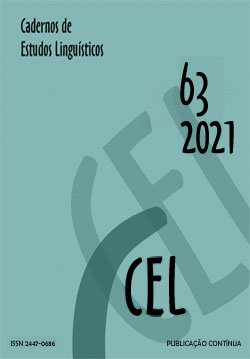Abstract
Historically, our society was built from a male model of organization, and throughout its constitution it promoted and ratified forms of violence against women, always based on the concept of feminine fragility and sensitivity, which implied the notions of inferiority and submission. As militants and in search of equality, women took to the streets and their bodies became discourses that bring the “inside out” of the history of dominance, building other possibilities of meaning and memory in the fight against male chauvinism. In this article, our goal is to observe, in some publications on social networks, the place attributed to women and feminism in the midst of stereotypes and imaginary crystallized in our society and which occupy our discursive space. To this end, our material consists of four memes published on Instagram, highlighting, above all, this pre-determined and utopian dominant ideal about the role of women, satirizing the struggle and resistance configured by social movements and, especially, feminism. In this sense, our analytical endeavor will be based on the theoretical assumptions of the French discourse analysis, especially in considerations about the notions of memory and pre-built.
References
AMOSSY, R. & PIERROT, A. H. Estereotipos y clichés. Traducción y adaptación: Lelia Gándara. 1ª ed. 4ª. reimp. Buenos Aires: Eudeba, 2001. Ed. original: 1997. Enciclopedia Semiológica. 136p.
BASSANEZZI, Carla. As mulheres dos anos dourados. In: DEL PRIORE, E. M. (org.). BASSANEZI, C. (coord.). História das mulheres no Brasil. São Paulo: Contexto, 2007, p. 608.
Bela, recatada e do lar. Revista Veja, 18 abr. 2016. Disponível em: https://veja.abril.com.br/brasil/marcela-temer-bela-recatada-e-do-lar/. Acesso em: 23 out. 2020.
BONEFANT, M. Le méme numérique : étude sémiotique des réseaux à partir des concepts de trace e d'indice. In: RISCP 12. http://communiquer.revues.org/1295, 2014.
BRANDÃO, H, H. N. Introdução à análise do discurso. Campinas: Editora da Unicamp, 2012.
BRIGLIA, T. M.; SACRAMENTO, S. M. P. Percursos da nação e do feminino nos anos dourados. In: Revista Cadernos de Letras da UFF. Volume 40, 2010. p. 203 – 221. Disponível em: <http://www.cadernosdeletras.uff.br/joomla/images/stories/edicoes/40/artigo10.pdf> . Acesso em 2 de julho de 2019.
Camillarafiso. “Posso viver sem o feminismo, mas sem minha máquina de lavar roupa...nunca!!!”. Instagram, 15 jan. 2019. Disponível em: <https://www.instagram.com/p/Bspzj0VA9Kt/?igshid=1n85s0h43jnfv>. Acesso em 23 de out. 2020.
CASTELS, M. Redes de indignação e esperança: movimentos sociais na era da inter-net. Rio de Janeiro: Zahar, 2013.
CESTARI, M. J. Nós político no discurso feminista dos anos 70. Anais do Seta, n. 4, p. 779-792, 2010.
CHAVES, T. V. Da Marcha das Vadias às vadias da marcha: discurso sobre as mulheres e o espaço. 2015. 145p. Dissertação (Dissertação em Linguística) – Programa de Pós-Graduação em Linguística, Instituto de Estudos da Linguagem, Universidade Estadual de Campinas, Campinas, 2015. Disponível em: http://repositorio.unicamp.br/jspui/bitstream/REPOSIP/271053/1/Chaves_Tyara
Veriato_M.pdf. Acesso em: 1º. jun. 2021.
DAVALLON, J. A imagem, uma arte de memória? In: ACHARD, P. (org.). Papel da memória. Campinas: Pontes, 2010.
FOUCAULT, M. O jogo de Michel Foucault. In:_Ditos e escritos XIX: genealogia da ética, subjetividade e sexualidade. Rio de Janeiro: Forense Universitária, 2015, p. 44-77.
FLOOD, M. International encyclopedia of men and masculinities. Abingdon/UK: Routlege, 2007.
Mulherespatriotas. “Feminina sim. Feminista, jamais! Buenos días!”. Instagram, 25 jul. 2018. Disponível em: <https://www.instagram.com/p/BlqJSNSAdP5/?igshid=gc90dx6lnuty>. Acesso em 23 de out. 2020.
NUNES, J. H. Introdução. In: ACHARD, P. (org.). Papel da memória. Campinas: Pontes, 2010.
ORLANDI, E. Análise de Discurso: princípios e procedimentos. Campinas: Pontes, 2002.
PAVEAU, M. A. L’analyse du discours numérique. Dictionnaire des formes et des pratiques. Paris: Hermann, 2017.
PÊCHEUX, M. Papel da memória. In: ACHARD, P. (org.). Papel da memória. Campinas: Pontes, 2010.
PÊCHEUX, M. Delimitações, inversões, deslocamentos. Cadernos de Estudos Linguísticos, Campinas, n. 19, p. 7-24, jul. 1990.
PINTO, C. R. J. Uma história do feminismo no Brasil. São Paulo: Fundação Perseu Abramo, 2003.
PIOVEZANI, C.; GENTILE, E. A linguagem fascista. São Paulo: Editora Hedra, 2020.
POSSENTI, S. Cinco ensaios sobre humor. São Paulo: Editora Parábola, 2018. 176p.
Postagem da Revista TPM, 03 mai. 2019. Disponível em: <https://twitter.com/revistatpm/status/1124389313242857474?lang=da>. Acesso em 03 jun. 2021.
SCHMIDT, M. T. Refutações ao feminismo: (des)compassos da cultura letrada brasileira. Estudos feministas. vol. 14, n. 3. Florianópolis: UFSC, set./dez. 2006, p. 765-799. Disponível em: https://periodicos.ufsc.br/index.php/ref/article/view/S0104-026X2006000300011, acesso em 04 jun. 2021.

This work is licensed under a Creative Commons Attribution-NonCommercial 4.0 International License.
Copyright (c) 2021 Cadernos de Estudos Linguísticos


